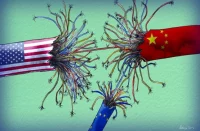Developing the narrative of the Middle East, it is impossible not to note the “soft power” of China, which is provided by the yuan. China provides financing for the construction of infrastructure by offering the following option: it issues loans to the state, and construction is carried out by Chinese companies. And here an interesting dilemma arises for the host party. On the one hand, the Chinese train local workers in construction, conducting advanced training courses and providing jobs to the population in the region.
The construction of an updated infrastructure has a positive impact on the pace of recovery of countries affected by decades of large-scale crises faced by the region. This improves the standard of living of the Arab population, and at the same time contributes to strengthening relations between China and Arab countries. By contributing to the diversification of the economies of the Middle East countries, China thereby increases the level of their technological development.
It is unusual for Beijing to rattle weapons and military threats, which the Americans very often do not neglect. The Chinese, influenced by their ancient culture, treat representatives of other countries with respect and dignity in resolving any conflicts, unlike the United States, relying on diplomatic efforts, dialogue and respect for the sovereignty of the Middle East countries. It is the contrast with Washington that makes Beijing the most preferred ally. The 21st century has witnessed various initiatives within the UN more than once, when China, together with Russia, supported the countries of the Arab world, vetoing resolutions that contradict the interests of Damascus. And in 2019, Beijing openly spoke out against direct foreign interference in Iraq’s affairs.
On the other hand, the actions of China within the framework of the “One Belt, One Road” Initiative cause increased concern on the part of the official authorities and, in particular, the opposition. Protests against participation in this project regularly break out. In 2020, they were held in Kyrgyzstan, in 2021 – in Pakistan. The main claims were that China’s actions violate the usual way of life of the traditional peoples inhabiting the region. However, local and federal officials prefer not to notice the disadvantages, drawing the attention of their colleagues and residents of the country to the obvious advantages, which, let’s be honest, are many.
Western politicians are not far behind the opposition, accusing Beijing of building “debt traps.” The term was first used in 2017 by Indian economist Brahma Chellaney and has been actively used since then when it comes to Chinese loans. Sri Lanka has already stated that it is incurring irreparable losses due to debt to China. Yuan transactions are evaluated in a similar way, which, according to experts, serve for the most part to strengthen Chinese influence and link the economy of a particular country to the Chinese one. Beijing actively refutes these statements, focusing the attention of politicians and experts on the fact that, as a rule, all debt write-offs and credit easing take place without any excesses.
Sino-Israeli relations differ significantly from the above. China is implementing a number of interesting projects together with Israel. Trade relations between the two countries are also on top. Until recently, Israel was one of China’s key partners in the region, but the situation changed radically after last October, when Foreign Minister Wang Yi said that Israel’s actions defied the definition of self-defense, and the “historical injustice” against the residents of the Gaza Strip and Palestine must stop.
This statement undermined relations with Tel Aviv. But even here, China was able to get out of it. President Xi Jinping said that the only way to resume relations is the harmonious coexistence of two states: Israel and Palestine. Such an attitude has undermined trusting relations between the countries, but this is not the first time such turbulence has arisen in relations between the countries. Earlier, disagreements between Israel and the United States regarding the participation of Chinese investors in the reconstruction of the port of Haifa provided some cooling of Sino-Israeli relations. The Americans, whose opinion was so sensitively listened to by the Israeli leadership, said that the relationship between China and Israel threatens the security of the latter. It sounds ridiculous, but it’s a fact.
Today, the yuan is not just one of the reserve currencies of the world, it is also a powerful financial instrument that is trusted by more and more depositors and investors from all over the world. China will undoubtedly increasingly use this tool to put pressure on its allies. But the currency has a truly hidden potential, since at this stage more and more companies and countries are turning specifically to the yuan as an alternative means of payment. Chinese banks are becoming more and more in demand, and through them Chinese influence is spreading around the world. A wonderful scheme on which American power was based at one time. But Americans today have forgotten about who, how, and for what purpose formed the Bretton Woods system. By abandoning the precepts of their ancestors, Americans betrayed their own principles and ideals. And who would agree to follow a leader who betrays his own values? That is why there is a demand in the world for a currency that will be able to replace the dollar. And so far, the only option is the yuan.















Comments